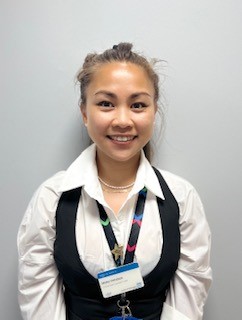RESEARCH: HUMAN FACTORS IN THE CARE OF DETORIORATING PATIENTS OUT-OF-HOURS - RAPID RESPONSE SYSTEMS
 What stage of your research career are you currently at, and what are your research interests?
What stage of your research career are you currently at, and what are your research interests?
I am at a very early stage of my research career; I have been recently awarded with a Pre-doctoral Clinical Academic Fellowship, giving me protected time to further explore the facilitators and barriers to nurses’ timely recognition and escalation of deteriorating patients out-of-hours.
How did you get into research?
I got into research because of an innate sense of curiosity and commitment to addressing enduring issues. I sought help through our Trust research department, CATO, and explored my options online. I was fortunate enough to have met brilliant academics who guided me through my NIHR application.
What do you enjoy about research?
Delving into the literature related to a topic of great interest to me; connecting with like-minded individuals who share the same mindset and a passion for improving patient outcomes; applying what I learned theoretically to my clinical practice.
What challenges do you face as a researcher?
I am still finding my feet, balancing my clinical commitments, research endeavours and maintaining a social life. I am getting tips from other academics though, which is wonderful for a novice like myself.
What difference has your research training and experience made to your career?
The research training has afforded me a clearer trajectory to where/what I want to be in the next five years. Speaking to other clinical academics, I have learned a lot from what they have done, their challenges, so I could prepare; and widened my knowledge on available opportunities.
What do you think is the greatest misconception about clinical academia?
One significant misconception is the belief that it may not be accessible to internationally educated professionals. I once assumed that it would pose as a barrier to my journey, I was wrong!
I have also observed that junior clinical professionals often associate clinical academia primarily with clinical trials. I am eager to contribute to changing these misconceptions.
How has research changed your clinical practice?
Gaining a deep understanding of the theoretical foundations behind clinical practice has enhanced my effectiveness as a practitioner, and a leader. My training has further fuelled my passion and dedication to innovate and drive quality improvement initiatives.
What has made a difference to progressing your research career?
Receiving the NIHR fellowship has significantly propelled my research career. This achievement would not have been possible without the invaluable guidance form my supervisors, mentors and senior colleagues. If I could offer advice to fellow aspiring academics, it would be: “Do not be afraid to ask for help”.
Where do you see your clinical academic career going over the next few years?
My aspiration would be finishing my pre-doctoral fellowship with accomplished objectives and securing a NIHR Doctoral Clinical and Practitioner Academic Fellowship (DCAF). My goal is to establish more efficient systems which would enable nurses to work more effectively even at vulnerable times, whilst maintaining the utmost commitment to patient safety.
Misha Denise Virtudazo, Advanced Clinical Practitioner & Critical Care Outreach Lead, Chelsea and Westminster Hospitals NHS Foundation Trust, misha.virtudazo@nhs.net
To download Julian's case study please click here: Misha Virtudazo - Case Study (PDF)
Useful links
Contact us
The CATO Team and Radiographers Incubator work on a Hybrid model, combining days in the office with days working from home – the best way to reach us is by email.
cato@imperial.ac.uk
radresearch@imperial.ac.uk
+44 (0)20 3313 7397

